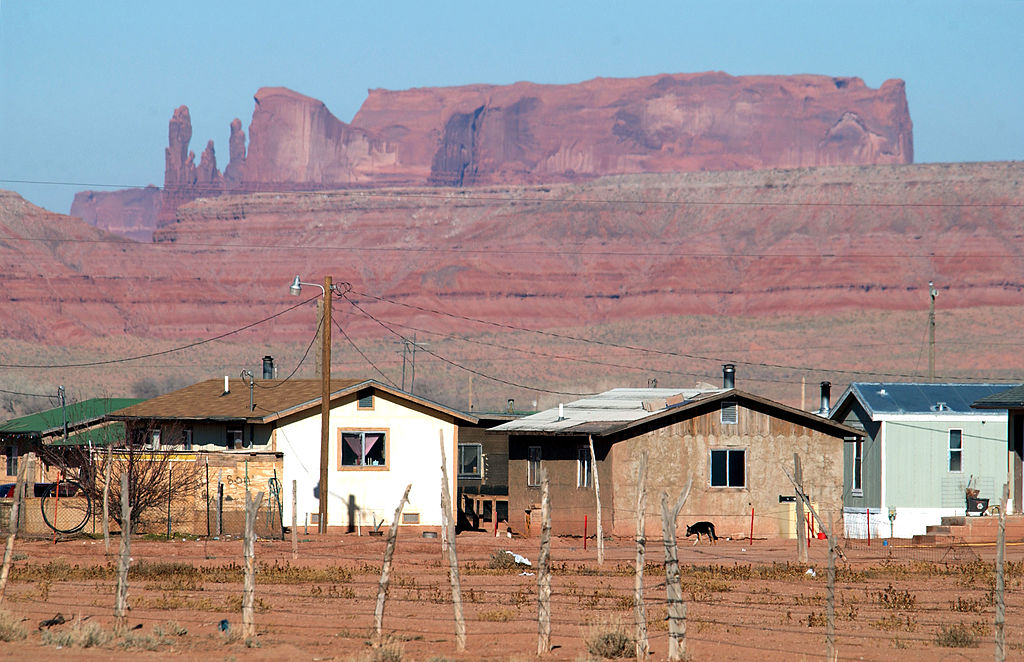Doctors Without Borders sends team to help Navajo Nation battle the coronavirus


A free daily email with the biggest news stories of the day – and the best features from TheWeek.com
You are now subscribed
Your newsletter sign-up was successful
Doctors Without Borders has sent nine medical professionals to the Navajo Nation to help communities that have been ravaged by the coronavirus.
Doctors Without Borders is an international humanitarian organization that works in conflict zones. "There are many situations in which we do not intervene in the United States, but this has a particular risk profile," Jean Stowell, head of the group's U.S. COVID-19 Response Team, told CBS News on Monday. "Situationally, the Native American communities are at a much higher risk for complications from COVID-19 and also from community spread because they don't have access to the variety of things that make it possible to self-isolate."
About 170,000 people live in the Navajo Nation, where there are more coronavirus cases per capita than in any state. In addition to dealing with a lack of specialized medical staff, the Navajo Nation is also a food desert and an estimated one in three residents do not have access to running water. "I think it's difficult for Americans to realize how big this country is and how the needs are so different in each place," Stowell said. "You know, urban needs are very different than rural needs. And the needs of the Native American community are challenging because they look so different than the needs elsewhere, so they require a pretty significant coordinated effort."
The Week
Escape your echo chamber. Get the facts behind the news, plus analysis from multiple perspectives.

Sign up for The Week's Free Newsletters
From our morning news briefing to a weekly Good News Newsletter, get the best of The Week delivered directly to your inbox.
From our morning news briefing to a weekly Good News Newsletter, get the best of The Week delivered directly to your inbox.
The team sent to the Navajo Nation includes two physicians, three nurses/midwives, a water sanitation specialist, two logisticians, and a health educator. The plan is for them to stay until the end of June, but they will remain longer if needed. "There is quite a lot of interest in responding to the needs of Native communities, but there are also enormous needs," Stowell said. "And it's not so quick to mobilize things that you really have to start from the ground up. These were bigger problems long before COVID-19."
A free daily email with the biggest news stories of the day – and the best features from TheWeek.com
Catherine Garcia has worked as a senior writer at The Week since 2014. Her writing and reporting have appeared in Entertainment Weekly, The New York Times, Wirecutter, NBC News and "The Book of Jezebel," among others. She's a graduate of the University of Redlands and the Columbia University Graduate School of Journalism.
-
 The Olympic timekeepers keeping the Games on track
The Olympic timekeepers keeping the Games on trackUnder the Radar Swiss watchmaking giant Omega has been at the finish line of every Olympic Games for nearly 100 years
-
 Will increasing tensions with Iran boil over into war?
Will increasing tensions with Iran boil over into war?Today’s Big Question President Donald Trump has recently been threatening the country
-
 Corruption: The spy sheikh and the president
Corruption: The spy sheikh and the presidentFeature Trump is at the center of another scandal
-
 Trump HHS slashes advised child vaccinations
Trump HHS slashes advised child vaccinationsSpeed Read In a widely condemned move, the CDC will now recommend that children get vaccinated against 11 communicable diseases, not 17
-
 FDA OKs generic abortion pill, riling the right
FDA OKs generic abortion pill, riling the rightSpeed Read The drug in question is a generic version of mifepristone, used to carry out two-thirds of US abortions
-
 RFK Jr. vaccine panel advises restricting MMRV shot
RFK Jr. vaccine panel advises restricting MMRV shotSpeed Read The committee voted to restrict access to a childhood vaccine against chickenpox
-
 Texas declares end to measles outbreak
Texas declares end to measles outbreakSpeed Read The vaccine-preventable disease is still spreading in neighboring states, Mexico and Canada
-
 RFK Jr. shuts down mRNA vaccine funding at agency
RFK Jr. shuts down mRNA vaccine funding at agencySpeed Read The decision canceled or modified 22 projects, primarily for work on vaccines and therapeutics for respiratory viruses
-
 Measles cases surge to 33-year high
Measles cases surge to 33-year highSpeed Read The infection was declared eliminated from the US in 2000 but has seen a resurgence amid vaccine hesitancy
-
 Kennedy's vaccine panel signals skepticism, change
Kennedy's vaccine panel signals skepticism, changeSpeed Read RFK Jr.'s new vaccine advisory board intends to make changes to the decades-old US immunization system
-
 Kennedy ousts entire CDC vaccine advisory panel
Kennedy ousts entire CDC vaccine advisory panelspeed read Health Secretary RFK Jr. is a longtime anti-vaccine activist who has criticized the panel of experts
